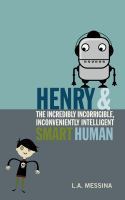What do you think?
Rate this book


176 pages, Paperback
First published December 6, 2012
In addition to sleep, your ETC-420-GX-2 requires eight to twelve MARFEL meal-pellet meals a day to maintain its energy supply. You will know when your ETC-420-GX-2's energy is low when it responds slowly to commands and makes frequent errors. In extreme cases, your ETC-420-GX-2 might cease to work entirely and will simply lay its head down on a table. To restore normal function, apply two MARFEL meal pellets immediately and count to twenty. [p.30]
The Use Chain described the machine hierarchy on Ferrous. Machines at the top of the evolutionary ladder, such as robots, were free to use the machines below them on the ladder in any manner they saw fit. Consolis, for example, a dependent mineralizer that grew in open fields, was harvested, treated and loaded with software to be used as video game consoles. Sedanmobiles, which roamed the Vast Open Space of the Very Far West, were caught and domesticated to be use as cars like his dad's Esperzo or his mom's Ergmenty.
Some robots argued that it was wrong for any machine, including robots, to use another machine. They believed all sedanmobiles should be set free and all consolis left alone to grow wild. They were even against the domestication of small machines as household pets, even though those machines were protected and treated kindly.
Anti-Use-Chainers argued that the invention of human technology made the need for machine exploitation unnecessary, since humans were created specifically to do the jobs robots didn't want to do. If humans could fulfill a function, then there was no reason for robots to exploit their fellow machines on Ferrous. [p.37]
That was it, Henry realized: E had an imagination. By picturing data that didn't exist, he could produce solutions that weren't based on fact. Henry could not. His algorithms followed logic protocols, so the only solutions he could produce were logical ones. But with the ability to go beyond the limits of logic, E could take processing to new heights.
And just then, Henry got it. Finally, he got why his mother and the newsbot and all of Sodium Falls were so worried. Yes, E was different from other human units. Yes, he could process complex commands or reasonate complicated problems or even store huge amounts of data on his cortextinator. But that wasn't what had their worry meters set to MASSIVELY WORRIED. No, it was the fact that Henry [sic] could do anything in the world. He had no limitations. No boundaries. No restrictions. No restraints. No protocols. He could do whatever he wanted. Nothing was off-limits. Nothing was forbidden. His potential was endless. Given the right circumstances, E could do things Henry couldn't even begin to process. Things nobot could.
And that was terrifying. [p.118]